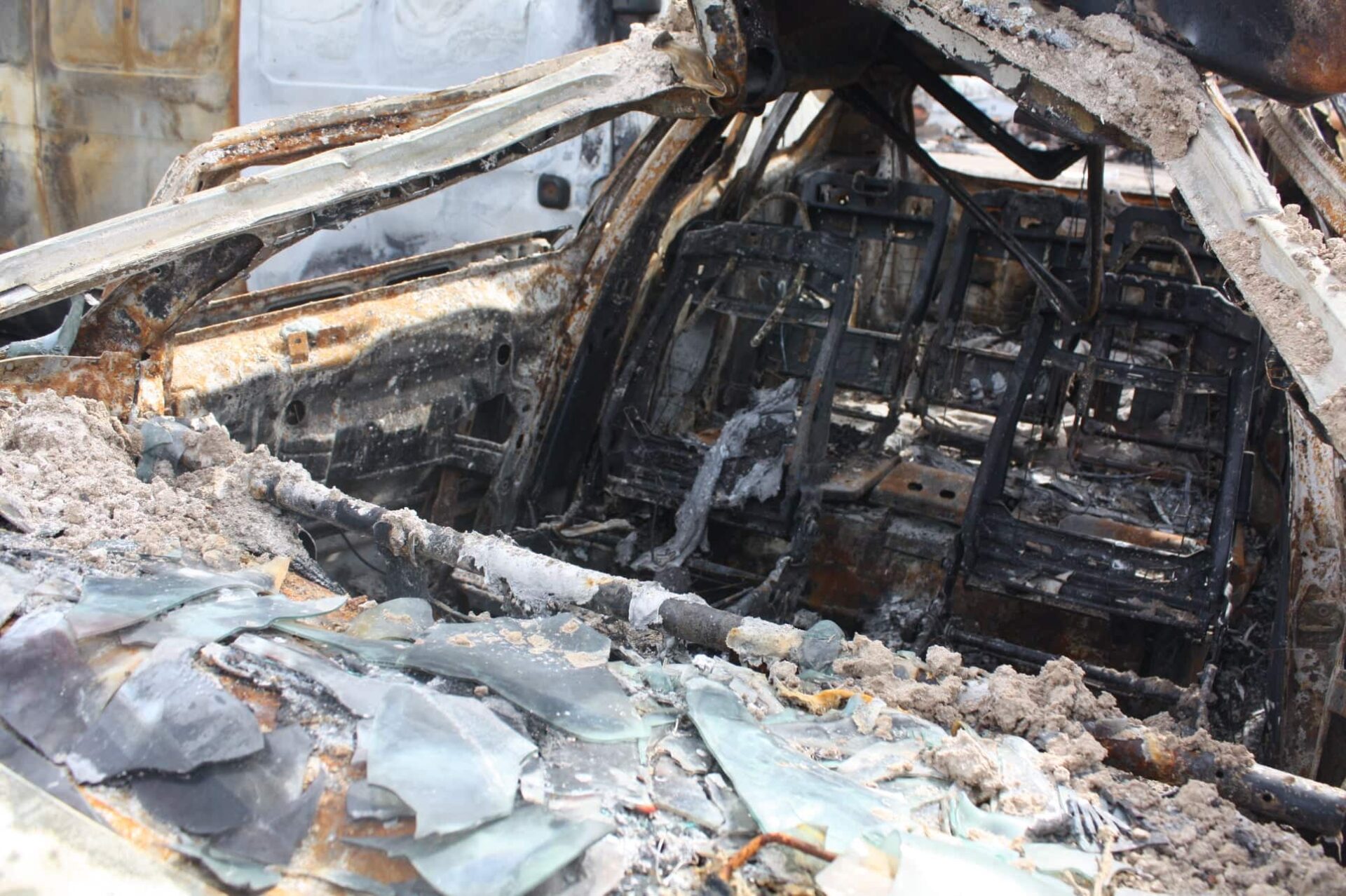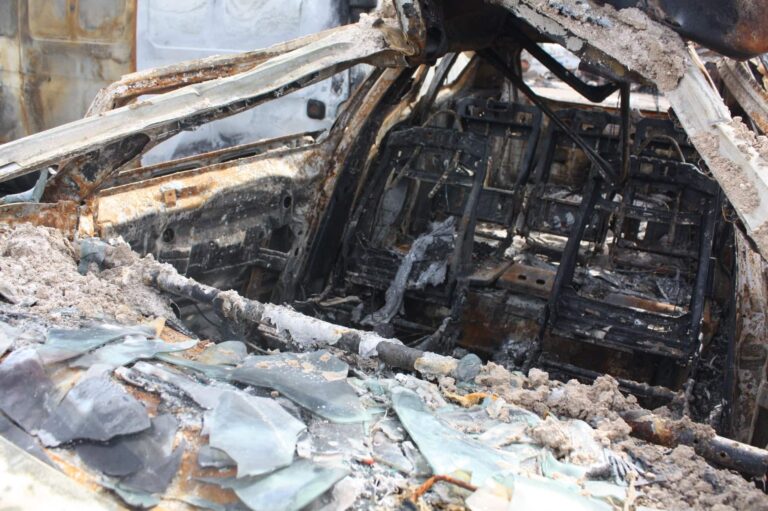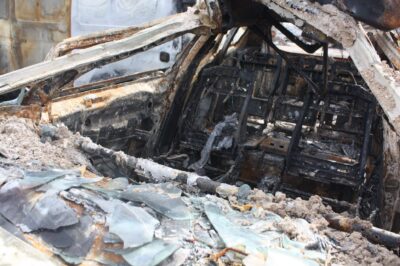Notes from Ukraine written by Paweł Reszka, journalist of “Polityka” magazine, originally posted in Polish on his Facebook account.
April 14
If someone asked me to picture one, single scene from this war, I would tell about a car. I see hundreds of them. This particular one is small. It has white ribbons tied to side-mirrors and word “Children” written on the window. It’s riddled with bullet holes. Inside, you can see blankets, papers, and blood on the seats. There are many more like it, burned, crushed by tank tracks, left in roadside ditches.
I’ve decided to retell the fate of at least one of those cars. I wrote a story about it for “Polityka” magazine, the one that sent me to Ukraine. Below, you’ll find an excerpt.
Bodies
They’ve started to connect the dots after Sasha’s call, but not sooner. Their neighbour, Oleg Doroshuk, recalled that he saw a burned car when he walked down Chkalova Street. He went back there to take a closer look. There were charred bodies inside. Oleg guessed they must have belong to Margarita’s and her kids. He wanted to take them right then and there, but was chased away by a Russian soldier. “Not allowed.”
So he went to the mayor’s office.
“There are kids lying there, and their mom.”
They’ve told him they can’t do a thing about it. Russians forbade to transport bodies. He can take care of it on his own, at his own risk.
“I couldn’t sleep all night,” says Doroshuk.
Bucha was a lawless town. Bodies of civilians lay on the streets. Russians ransacked shops, raped, set fire to homesteads.
German intelligence intercepted calls between Russian soldiers deployed in Bucha. They talked about shooting civilians, informed one another what to do with prisoners. “Question them, and then shoot them.” We don’t know how much was overheard, but we do know what conclusion was reached by German analysts (you can read about it in a reputable magazine “Der Spiegel”). What happened in Bucha was not an act committed by some unsubordinated ruffians, but a part of a larger plan – to intimidate civilian population and by doing so, break Ukraine’s resistance.
It makes sense. If it weren’t for the help of ordinary people, Ukrainian army wouldn’t, most likely, survive the initial onslaught. Once they’ve crossed the border, Russian troops went blind and deaf. Unlike their Ukrainian adversaries who knew almost everything. Civilians counted passing tanks, described where artillery guns stood and where infantry units hid. They’ve used cell-phones to report their findings to Ukrainian military.
Russians shied away from byroads to avoid ambushes, as few territorials armed with grenade launchers could easily destroy a tank and then vanish behind surrounding buildings. On the main roads, Russian didn’t fare much better, either. Columns of armoured vehicles were decimated by drones and artillery fire.
Terror was supposed to change that – blind Ukrainian forces and cut them off from civilian help.
Doroshuk kept thinking about Margarita’s charred remains. And wondered what would happen to him if he’d run into one of Russian patrols. He even came up with an explanation.
“To bury the dead is a Christian thing to do. They’ve been lying in that burned car for four days now. It’s not right,” he would have said.
On 28 March, he went to get them.
Just in time. One of the charred bodies was dragged outside, onto the asphalt.
“Dogs, you see,” Doroshuk lowers his voice.
He pulled orange cover out of a nearby Volkswagen minibus (also destroyed by Russkies). He carefully put charred remains, those of Rita and her boys, on it. Then, he picked single bones and ribs up, wrapped everything in a bundle and walked away. He carried his neighbours on his back, with his heart in his mouth.
Doroshuk dragged his feet. Even though not much remained of his neighbours, he was still carrying three bodies. And he was afraid of Russkies – that orange bundle could easily be seen from a mile away. After 600 meters, he run out of steam.
April 11
The woman whose husband was murdered by a Russian soldier (shot to the temple) started to apologize, out of the blue.
“My Ukrainian is terrible. It’s easier for me to speak Russian…”
“That’s fine. It’s easier for me too. Much, much easier,” I replied.
It took me a while to realize that the woman clad in black barely spoke Ukrainian. Russian, her first language, was not enough to spare her husband’s life. And it didn’t help to end hers.
“Shot me too!” she screamed at the killer, hunching over the body of her loved one.
(“Blood poured out of my husband’s head in waves, you know. And for a moment, I though he’s alive, because his heart was still beating. Silly me.”)
***
I couldn’t write for the past few days. To write is to see images. And each time I closed my eyes I saw only black body bags. I’ve been seeing them for a week. Body bags near bus stops. Body bags in mass graves. Waiting for transport or being moved elsewhere. In refrigerator trucks, instead of usual cheese and milk. Or crammed in the back of an open pickup, next to a red mountain bike.
Anonymous. Stripped of their former life. From time to time, a shoe or a muddied hand slides out from underneath the plastic foil. The others are still underground, buried in lawns and yards, or in the mass grave near a church.
There are few more layers left, from first war burials – bodies muffled in rags, tossed inside in plain clothes.
Sergey Ostapenko stands over this hole. He is searching for his father.
“My dad is Ostapenko Vasily. He only has one leg, the left one was amputated. Can’t miss it. Have you seen him by any chance?”
“No, I haven’t. But I’ll keep this in mind. You can give me your number.”
“Certainly. Thank you.”
***
Standing with Ostapenko next to a hole, I had this thought. All that has happened over the past few weeks nullified everything else. As if Russia, en passant, committed suicide by murdering innocent people. Now, it lies dead, wrapped tightly in some black body bag. Because otherwise, it would at least shed a tear.
***
An air bomb, one of many that levelled Borodianka to the ground, tore down a wall of the apartment block. A beautiful library, full of Russian classics, fell down from a living room. Cold, wet books, that nobody needed nor wanted, met its end in the rain, atop a pile of debris and trash.
The owner must have been a connoisseur. He probably whispered in his lover’s ear how “chilled and numb” his heart was. He even might have said it with more passion than a pilot, who dropped bombs on his head. I’d wager that he used more elaborate words than a general, who gave the order. This bet will never be settled. Owner of the library lies dead beneath concrete rubble, most probably. He waits to be found and put into a body bag.
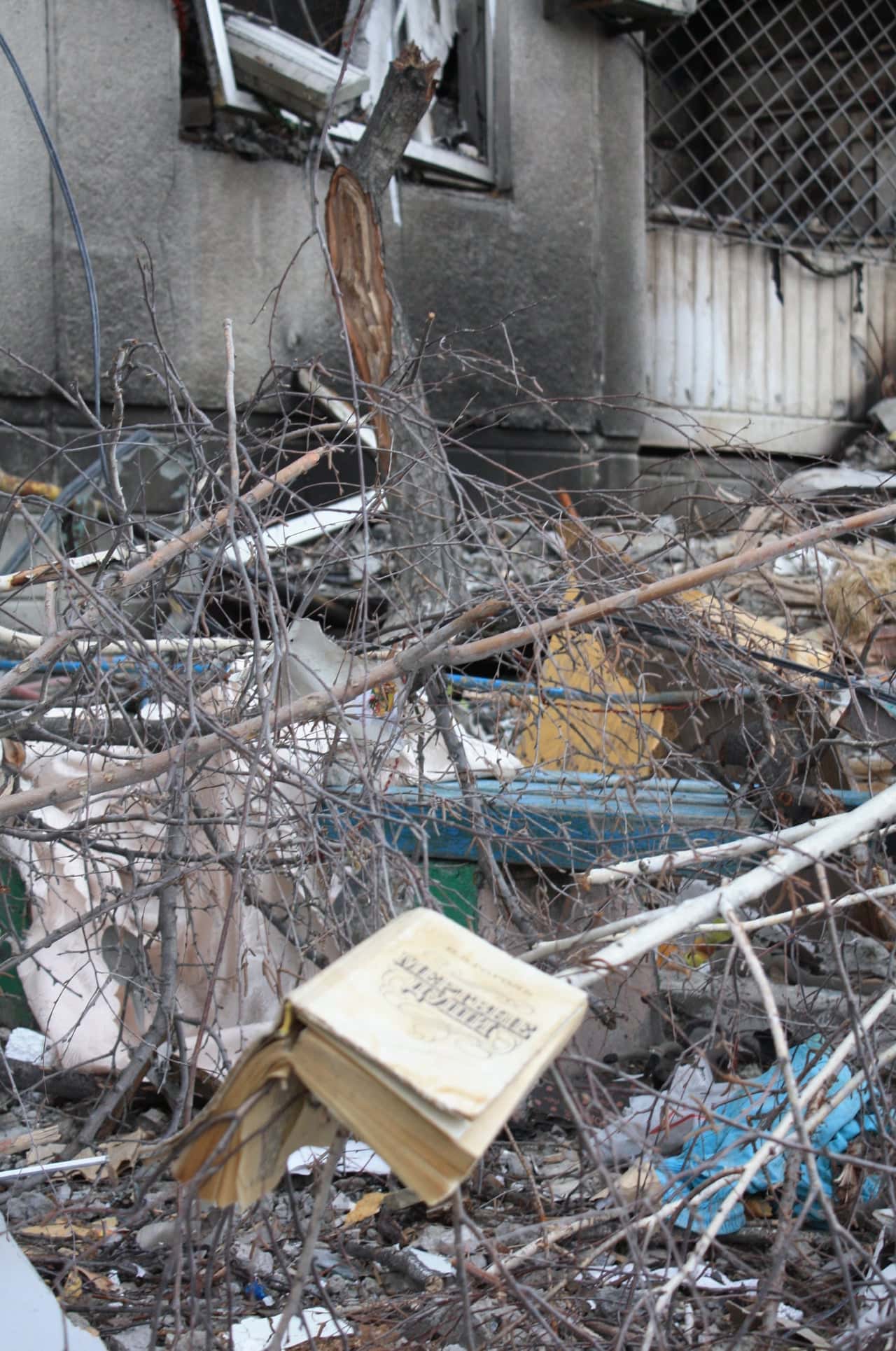
A library. Source: Paweł Reszka
***
There’s a park opposite the block with a library. And in it, there’s a bust of Taras Shevchenko. It has a hole in its head. It would appear that some Russian soldier, bored with murdering ordinary people, tried to kill a famous poet instead.
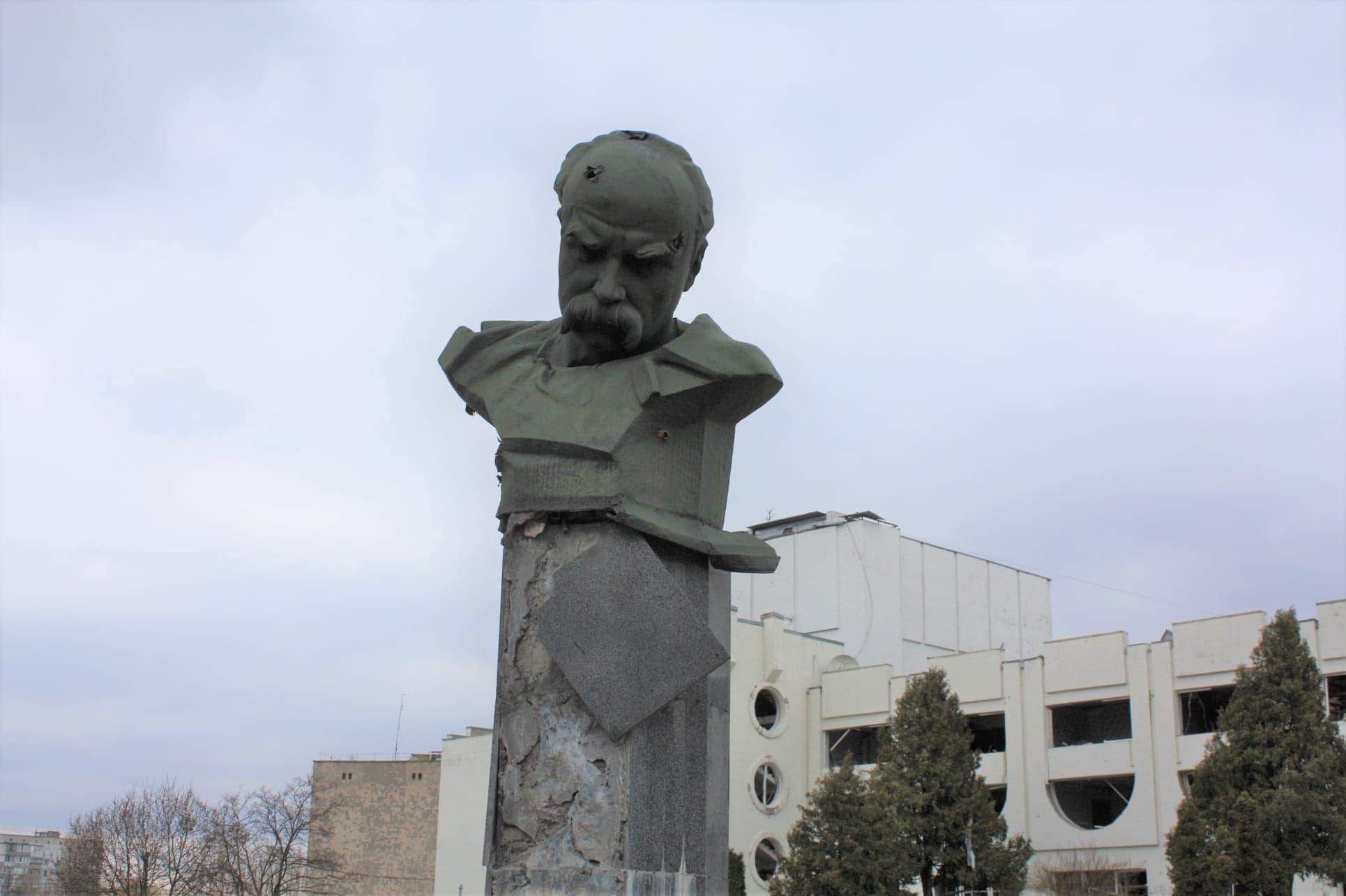
A bust of Taras Shevchenko has a hole in its head. Source: Paweł Reszka
***
A message waited for me in Kyiv. My Russian friend asked me: “Did Bucha really happen?”
“Yes, my dear. It surely did,” I replied.
Inadvertently, my thoughts wandered towards Moscow. I’ve tried to recall that morning on the Embankment. The cigarettes. Hundreds of ice crystals on the river’s surface. The silence. The spells warding off oncoming cars. Just to walk a little bit further, together…
Even that picture disappeared. I must have made it up – like everything else.
Only body bags are real.
April 6
Spring came.
I return from Bucha through Irpin. Spring came. I see people with brooms, rakes. It’s cleaning time. As if winter passed through here, not war.
It’s green, everywhere. Leaves. Buds. Nature. Subconsciously, you forget about all that is bad. All that have happened since morning.
Like Tanya, a very pretty girl who still lives in a basement.
“Tanya! Hi!”
“Hello!”
“You don’t look so good.”
“I have a cold. Do you have an aspirin?”
“I’ll get it. Tomorrow, tops. But you… you have to get out of that basement.”
“Yeah?” she asks like she didn’t understand.
“Why the f… you still stay there? Tan!”
“There’s no power in the city, no gas, you know. And no medicines. They bring water here. And lately, even food. I’d better stay here for a while longer.”
Same old song. Three days in a row. War made her lost her mind, clearly. She was the youngest one in that basement. She took care of everything – she cooked, hold hands, helped bury the bodies. It must be that.
“You’re coughing!”
“It’s dust, just dust. It makes me cough. But I’d better stay here a while. A day, maybe two.”
She’s afraid to come out. She doesn’t need an aspirin, but a psychiatrist. And she’ll need one for a very long time. How many psychiatrist are there in Bucha, I wonder. Because this entire town – murdered, raped and robbed for a whole month – qualifies for treatment.
I return from Bucha through Irpin, hitch-hiking with Ukrainian soldiers. They are fed up with war too. So we give it a wide berth.
“Look, storks!”
“It’s spring!”
“Lovely.”
There’s a body lying in a ditch. Naked. Gunned down with one shot at the Russian sentry post.
“Want to stop, Pasha?”
“If we can.”
“Sure. Do your thing.”
We move. Everybody talks about storks again. And spring.
Ira calls. We met today, through mutual friends.
“There’s a problem with my husband, you know,” she said then.
“What kind of problem? What happened?”
“They’ve taken him to Kyiv.”
“And?”
“I’m afraid they’ll bury him in a mass grave. And that’s not possible. Not possible for me. We were together, just the two of us. Whole 17 years. Me, him, a dog, and three cats. He was shot by Ruskies, the dog run away, two cats died in a fire. So I’m the only one left. Me and a cat. I don’t want him in a mass grave. That is why I want to ask…”
“Sure thing, dear Ira… Of course. We’ll see.”
What’s more to tell?
We drive. Kyiv’s near. And suddenly, a traffic jam!
“Finally.”
“Yesterday, people waited four hours to get in from the Kharkiv side!”
“Really?”
All of us don’t want to talk about certain things, right? For me, it’s Tanya who went mad. It’s Ira who’s all alone. It’s Luda, whose kid got lost.
“He went outside to take out the trash, promised to be back in a minute. Poof, into thin air. I’ve looked. Ruskies chased me away, but I kept saying ‘Leave me be. I’m looking for my child. Give me my child back and I’ll go.’”
She found him. By herself. He was lying near their house with a bullet in his head.
They are talking down the barricades in Kyiv. Hipster joints are open. Kids sit on sandbags, run among sniper posts, because it’s way more fun than playing on the playground.
There’s only twenty, maybe thirty kilometres left. Almost there!
Suddenly, the driver slams on the brakes. Sixteen body bags wait at the bus stop in Irpin. They wait for a transport to the morgue. City services collect bodies from the streets, roadside ditches, basements, abandoned flats.
“Our team finds fifteen, twenty bodies every day.”
“Want to stop, Pasha?”
“If we can.”
“Sure. Do your thing.”
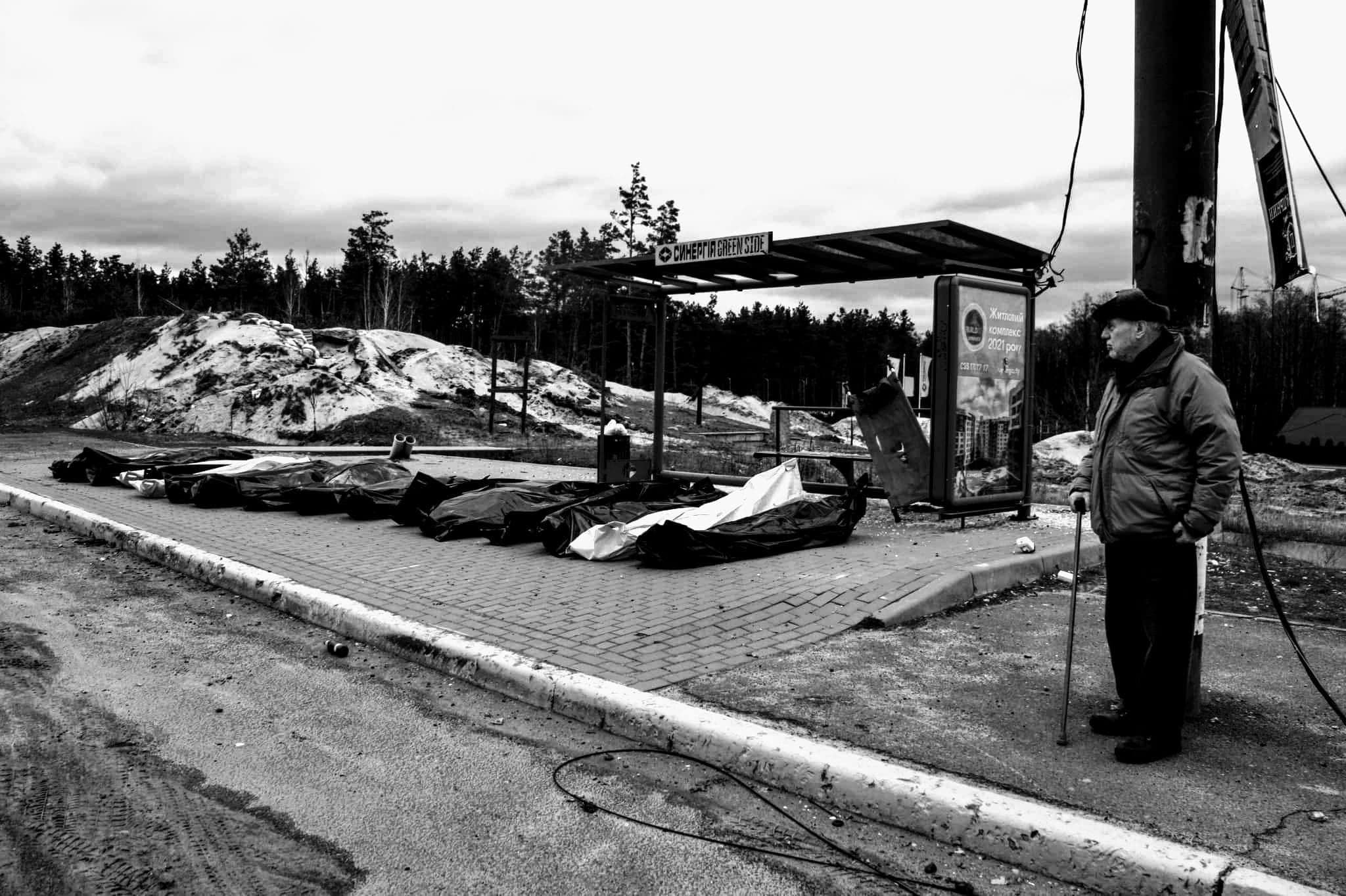
Sixteen body bags wait at the bus stop in Irpin. Source: Paweł Reszka
April 5
Borodianka really got under Ruskies’ skin. They wanted to cut a safe corridor through it, towards Kyiv. They’ve walked down Central Street, the widest in town (formerly Lenin Street), but every time a tank or BTR showed up, someone opened fire on them. That is why they shot at windows of multi-storey apartment blocks, relentlessly. First, they’ve used AK-47s, then machine guns, and finally tanks. But the fight still raged. Tanks got hit, one after another. Trucks caught fire. BTRs blew up. So, they’ve called close air support. Some blocks were destroyed by bombs, other were toppled by shockwave.
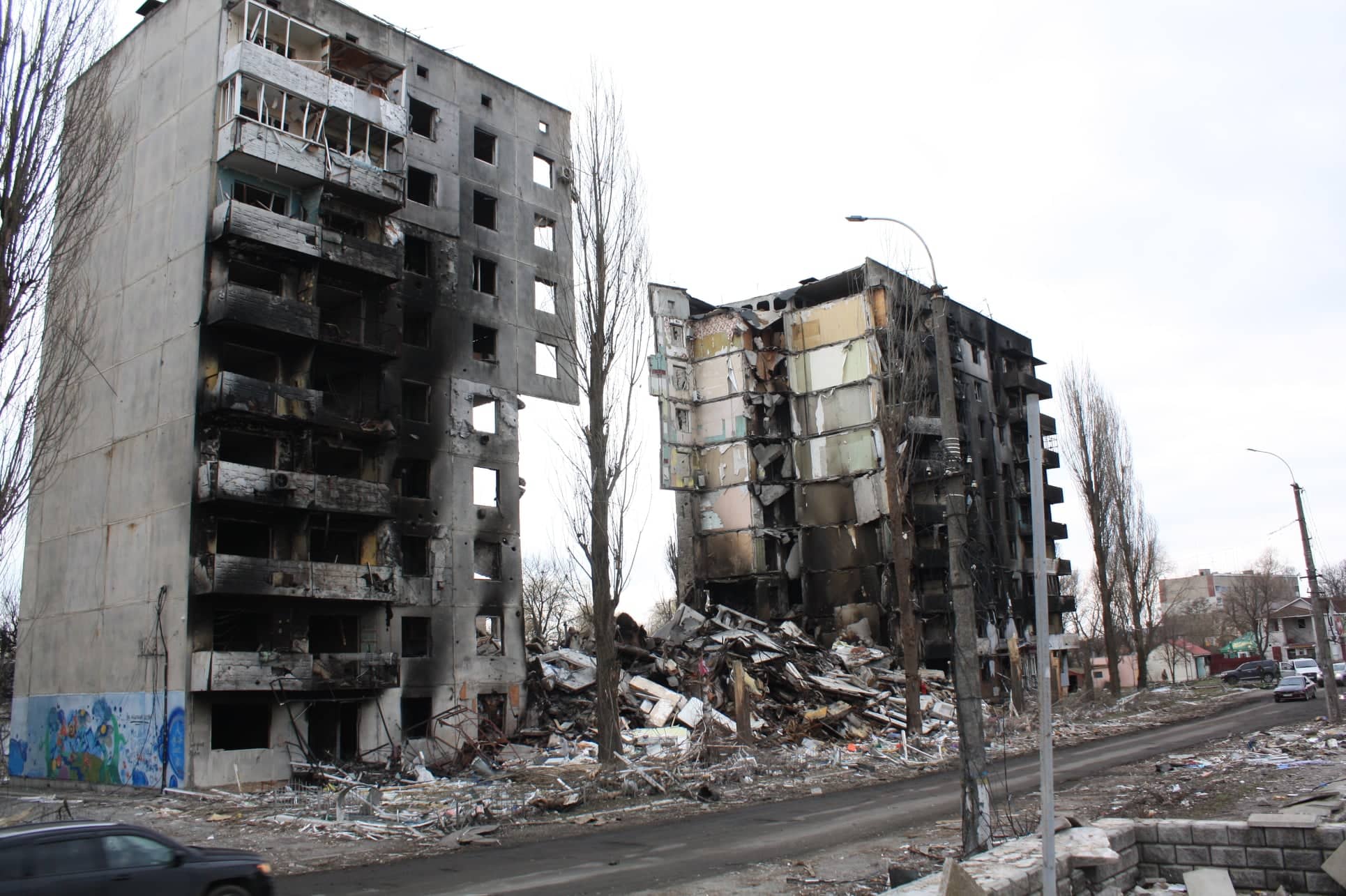
Borodianka. Source: Paweł Reszka
Nikolai: “I lived on the fourth floor. Now what? I can’t live there. If somebody told me a month ago, two months ago, Nikolai, your block will fall apart from a shockwave, I’d send them to a nuthouse.”
We stand near a garage, by the apartment block. People parked their cars behind a wall to shield them from shell fragments. But one bomb blew the wall down, toppling it over on cars. They were really nice, shiny and polished, just as cars are when Sunday comes to a provincial town.
To me, Borodianka feels strangely familiar. It has 13,000 inhabitants. Like Choszczno, more or less, where I was born.
So today, when I walked Central Street, I imagined it was “my” Freedom Street.
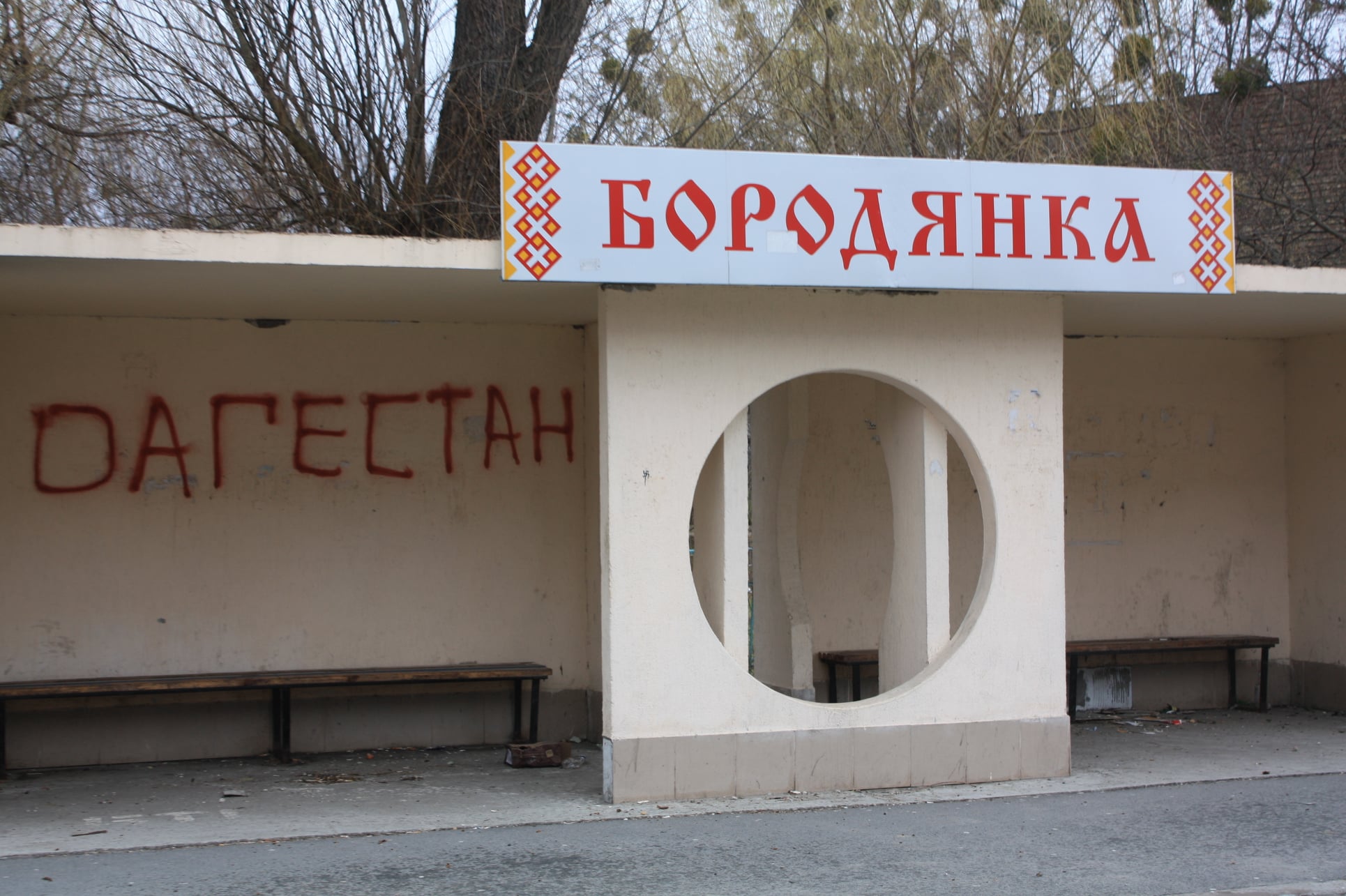
Here, stood an ATM, but it’s gone now. Ruskies came and gutted it open. They broke into a cell-phone shop (doors are smashed) and took everything, yanked the doors out with BTR. Then they’ve liberated a beer pub. And a computer shop. They even stole a John Deer tractor from farming cooperative “Ear of Grain” and…
“You won’t believe it, mister reporter,” says Sergey, the janitor, “They shat into bags of wheat. Want me to show you?”
Roman, owner of a marketplace, cleans the mess left by “liberators”.
“All stalls were robbed. Those belong to my tenants. I don’t know how they’ll get through this. Borodianka was helpless. Those who protested got knocked on the head with rifle butts, or shot in the head. Human life meant nothing. I found no bodies in Borodianka, but I saw two few kilometres outside the town, near a Russian sentry post.”
“He waltzes into your home just like that, in the middle of the night. What can you do? You hold your hands up high. You smile. You answer politely. After all, he holds an AK-47. He can gun you down with one burst,” says Adam, a pensioner who stayed in Borodianka.
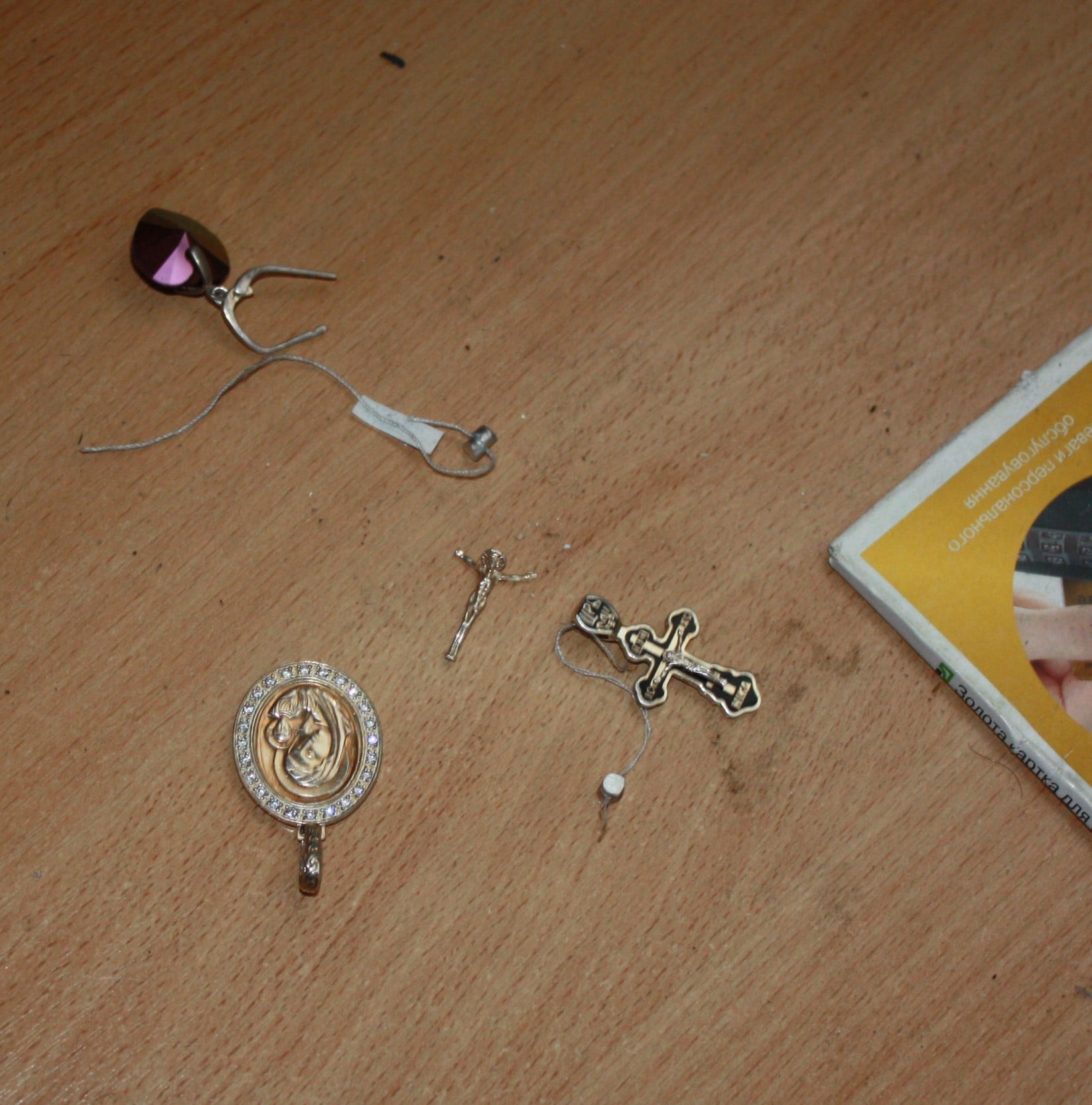
Jewellery deemed less valuable was left behind. Source: Paweł Reszka
With Ukrainian soldiers I met by chance, I search places where Ruskies slept. Where they divided their spoils. Jewellery deemed less valuable was left behind in the headquarters. There, they’ve prepared their defence. There, they’ve committed their crimes.
“When bombs fell on apartment blocks, we rushed to save our own. But Ruskies chased us away, won’t let us near. We heard screams. Gradually, they faded away,” I hear in Borodianka.
April 4
Bucha, just outside the outskirts of Kyiv. Russians were here for over a month.
Today, there are graves on the lawns, graves in front of apartment blocks, graves in the yards.
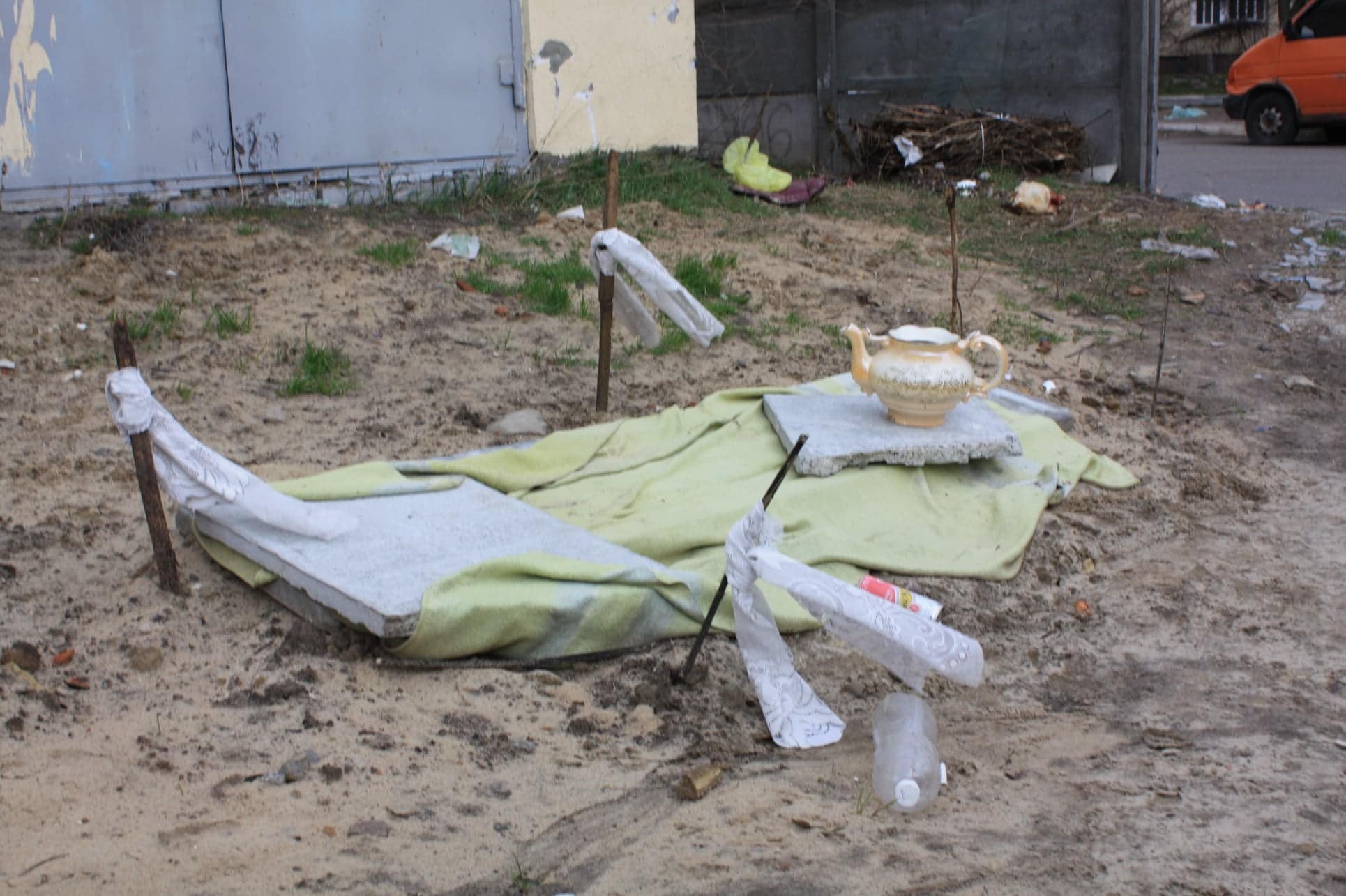
There are graves on the lawns, graves in front of apartment blocks, graves in the yards. Source: Paweł Reszka
“Here, we buried three people. Just look, mister reporter! We had to ask Russians for permission.”
Nursing home.
Grannies wearing diapers. Their skin is grey-blue. Dead. There was no one to take care of them. Carried outside, laid down by the pool. Not enough body-bags. Wrapped in rags. Helpless. They were lucky, though. There’s a woman lying on the lawn by the pool. Just like that. No one closed her eyes. No one covered her body. It collapsed inward. Forgotten.
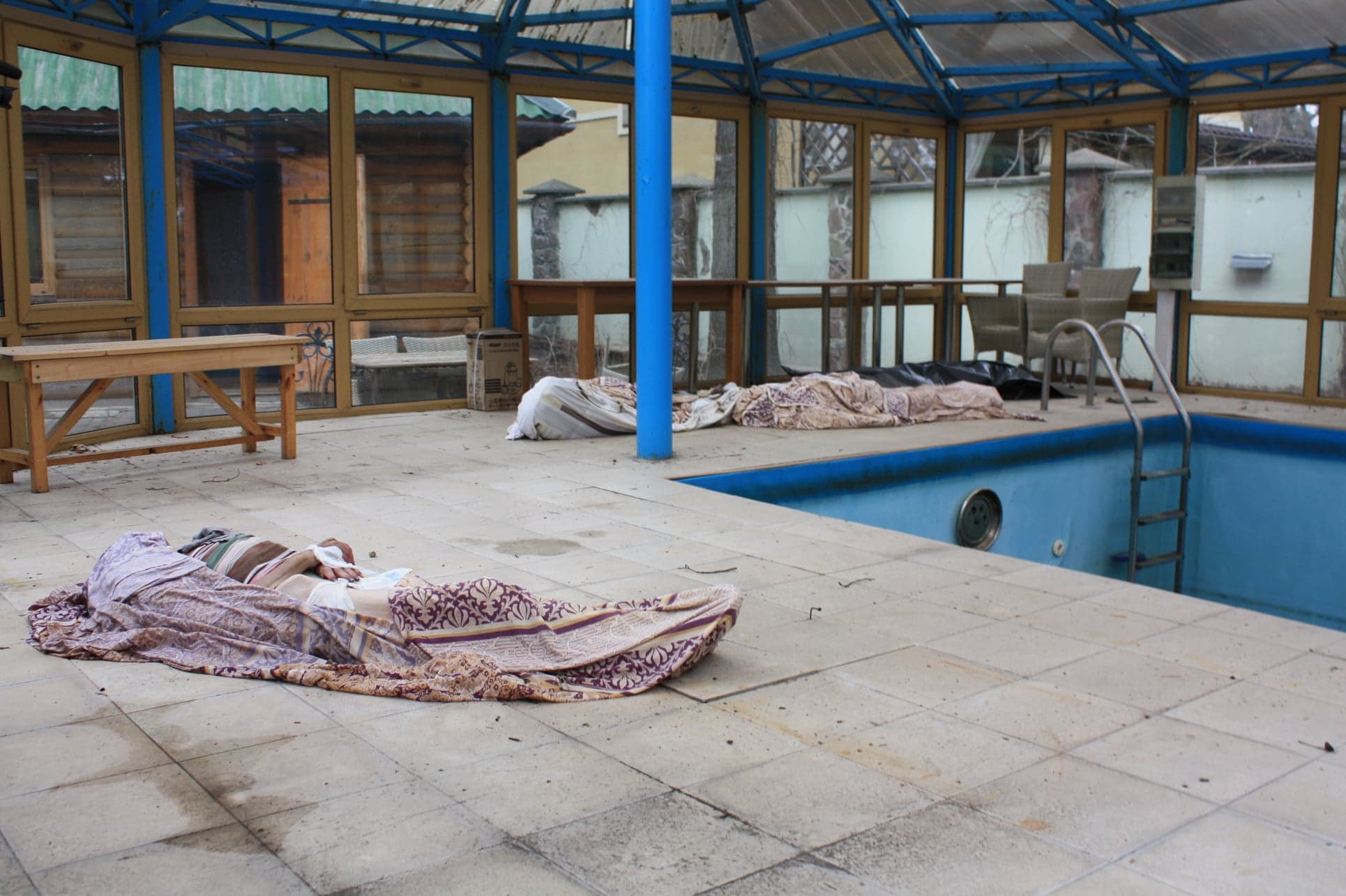
Bodies in nursing home. Source: Paweł Reszka
Nursing home on 59b Mikhaylovsky Street makes a good impression. Note left in the hall by the clock (it was too big to steal) reads: “Granny’s in room 4.” There’s a cell-phone number on it, her son’s. Maybe someone will call? Perhaps the son will answer?
Downtown, near “Yablonechka” kindergarten, bodies lie by the cellar’s entrance.
“Don’t go near that corpse! May be booby trapped!” “And here, they’ve killed a girl. Julia! That was her name.” “There, a man rode his bike. Sharakh. It took one burst. What do you mean, why? They are Ruskies.”

Mass graves. Source: Paweł Reszka
Bodies are being collected all over town. Excavators dig holes near Andrei Pervozvanny church. The first one is already covered. The second one is halfway full.
Translated from Polish by Michał Kompanowski
Polish journalist, co- founder of Fundacja Reporterów (Reporters Foundation). Worked as foreign correspondent covering Russia, former head of investigative desk at Dziennik daily. Based in Warsaw.

